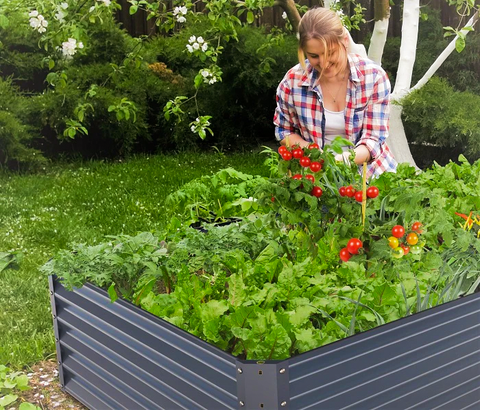In our fast-paced and often stressful world, finding solace and rejuvenation has become more important than ever. The healing power of nature is a well-known phenomenon, and harnessing it through gardening has become an increasingly popular avenue for promoting mental well-being. This therapeutic practice, often referred to as "gardening therapy," offers a range of psychological benefits that can enhance our quality of life. In this comprehensive guide, we will explore the profound mental health advantages of gardening, with a particular focus on the unique benefits of cultivating plants in raised beds. As advocates for innovation and eco-friendliness, we will also discuss how utilizing high-quality metal raised garden beds can further amplify these benefits. The following content also has some reference value for raised garden beds.
Understanding the Healing Power of Gardening
The concept of gardening as therapy isn't new; it has been practiced for centuries in various cultures around the world. The act of nurturing plants, witnessing growth, and engaging with the natural world has a profound impact on our mental, emotional, and even physical health. Gardening has been shown to reduce stress, anxiety, and depression, while also enhancing mood, focus, and overall life satisfaction. It's a holistic practice that engages our senses, encourages mindfulness, and fosters a sense of accomplishment.

The Mental Health Benefits of Gardening in Raised Beds
- Stress Reduction: Engaging with nature has been proven to lower cortisol levels, the hormone associated with stress. The act of tending to plants in raised beds, surrounded by the soothing beauty of your garden, can provide an instant sense of calm.
- Mindfulness and Presence: Gardening encourages mindfulness as you focus on the present moment, connecting with the textures, scents, and sounds of the garden. Raised beds bring these experiences closer to you, intensifying your connection.
- Sense of Accomplishment: Watching your plants thrive and your garden flourish creates a sense of achievement. Raised beds make this progress more visible, reinforcing feelings of success and competence.
- Connection to Seasons: Raised beds offer a front-row seat to the changing seasons. Observing the life cycle of plants, from seedlings to harvest, fosters a deeper connection to the natural world and a greater appreciation for its rhythms.
- Social Interaction: Gardening can foster connections with like-minded individuals. Community gardens and shared gardening spaces often use raised beds, providing opportunities for social interaction, collaboration, and the sharing of gardening knowledge.
- Creative Expression: Designing and arranging plants in raised beds is a form of creative expression. Nurturing a space that reflects your vision and personality can boost self-esteem and creativity.
- Focus and Distraction: Gardening provides a healthy distraction from negative thoughts and worries. Raised beds allow you to immerse yourself in the tasks at hand, redirecting your focus and promoting relaxation.
- Connection with Nature: Spending time in nature has been linked to improved mental health. Raised beds bring nature closer to you, allowing you to feel more connected even in limited outdoor spaces.
Raised Beds: Elevating the Gardening Experience
Raised beds offer a distinct advantage when it comes to gardening therapy. These elevated structures provide more than just functional benefits; they also enhance the therapeutic aspects of the practice:
Accessibility and Inclusivity: Raised beds are elevated, making them accessible to a broader range of individuals, including those with mobility issues or limited space. This inclusivity ensures that more people can experience the healing benefits of gardening.
Controlled Environment: Raised beds provide better control over soil quality, drainage, and pest management. This control contributes to a more successful gardening experience, reducing potential frustrations that could detract from the therapeutic aspect.
Reduced Physical Strain: The height of raised beds minimizes the need for bending and kneeling, reducing physical strain on the body. This is particularly beneficial for individuals with joint pain or limited flexibility.
Efficient Gardening: The organized layout of raised beds allows for efficient planting, weeding, and harvesting. This streamlined process reduces the sense of overwhelm and fosters a more enjoyable gardening experience.
Enhanced Aesthetics: Raised beds lend a neat and organized appearance to the garden, creating a visually pleasing and calming environment that contributes to overall mental well-being.
Elevating the Experience with Eco-Friendly Raised Garden Beds
When considering raised beds for gardening therapy, the choice of materials is crucial. Opting for high-quality, eco-friendly raised garden beds can further enhance the mental health benefits:
- Durability: Raised beds made from sustainable materials offer longevity, ensuring that your therapeutic gardening practice can continue uninterrupted for years to come.
- Aesthetic Appeal: Raised beds add an element of elegance and modernity to your garden space, contributing to the overall aesthetic appeal and visual pleasure of the environment.
- Stability and Support: Raised beds provide excellent stability, ensuring that your garden remains intact and secure as you nurture your plants.
- Sustainable Choice: Eco-friendly raised garden beds align with your commitment to sustainability and responsible consumption, contributing to a greener planet.
Creating Your Therapeutic Raised Bed Garden

Step 1: Choose Your Space
Select a location that receives ample sunlight and is easily accessible. Raised beds can be placed on patios, decks, balconies, or directly in the ground.
Step 2: Select the Right Bed
Opt for high-quality, eco-friendly raised garden beds that align with your sustainability values and provide durability for years to come.
Step 3: Plan Your Garden
Design your raised bed garden layout, considering the types of plants you want to grow and their specific sunlight and water needs.
Step 4: Choose Plants Wisely
Select plants that resonate with you and align with your gardening goals. Consider a mix of flowers, herbs, and vegetables that provide a variety of scents, colors, and textures.
Step 5: Engage in Mindful Gardening
Embrace the process of gardening as a form of mindfulness. Focus on the sensations of the soil, the fragrance of the plants, and the sounds of nature around you.
Step 6: Embrace the Journey
Celebrate each stage of growth in your raised bed garden. Witness the transformation of seeds into thriving plants, and allow yourself to revel in the sense of accomplishment.
Step 7: Share the Joy
Invite friends and loved ones to share in the joy of your garden. Engage in gardening together, exchanging stories, laughter, and the positive energy that comes from connection.
Conclusion
Gardening isn't just about cultivating plants; it's about cultivating well-being. The act of tending to your garden, nurturing your life, and connecting with nature can have a profound impact on your mental health. Raised beds, with their accessibility, organization, and efficiency, elevate the therapeutic experience even further. As you immerse yourself in this practice, you'll find solace, healing, and a renewed sense of vitality. By choosing eco-friendly metal raised garden beds, you're not only prioritizing your well-being but also contributing to a sustainable future—a future where nature and nurturing go hand in hand.










